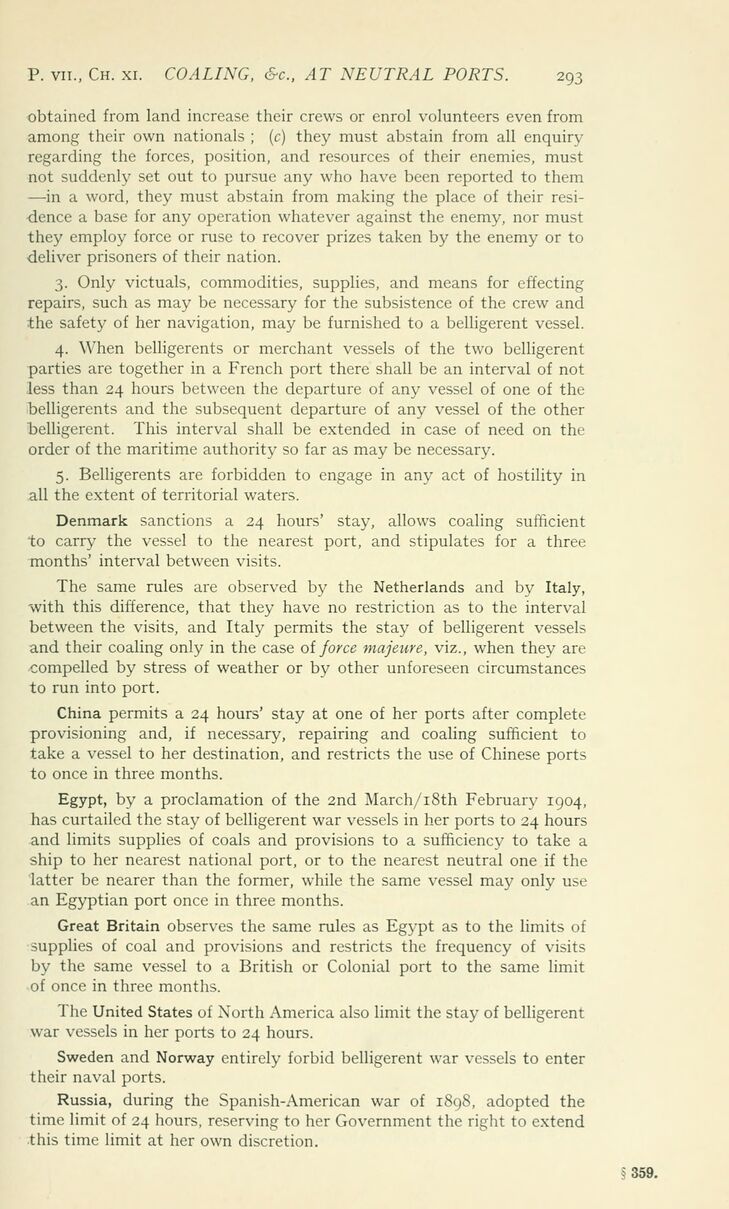
Full resolution (JPEG) - On this page / på denna sida - Pages ...

<< prev. page << föreg. sida << >> nästa sida >> next page >>
Below is the raw OCR text
from the above scanned image.
Do you see an error? Proofread the page now!
Här nedan syns maskintolkade texten från faksimilbilden ovan.
Ser du något fel? Korrekturläs sidan nu!
This page has never been proofread. / Denna sida har aldrig korrekturlästs.
P. vii., Сн. xi. COALING, &c., AT NEUTRAL PORTS.
29З
obtained from land increase their crews or enrol volunteers even from
among their own nationals ; (c) they must abstain from all enquiry
regarding the forces, position, and resources of their enemies, must
not suddenly set out to pursue any who have been reported to them
—in a word, they must abstain from making the place of their
residence a base for any operation whatever against the enemy, nor must
they employ force or ruse to recover prizes taken by the enemy or to
deliver prisoners of their nation.
3. Only victuals, commodities, supplies, and means for effecting
repairs, such as may be necessary for the subsistence of the crew and
the safety of her navigation, may be furnished to a belligerent vessel.
4. When belligerents or merchant vessels of the two belligerent
parties are together in a French port there shall be an interval of not
less than 24 hours between the departure of any vessel of one of the
belligerents and the subsequent departure of any vessel of the other
belligerent. This interval shall be extended in case of need on the
order of the maritime authority so far as may be necessary.
5. Belligerents are forbidden to engage in any act of hostility in
all the extent of territorial waters.
Denmark sanctions a 24 hours’ stay, allows coaling sufficient
to carry the vessel to the nearest port, and stipulates for a three
months’ interval between visits.
The same rules are observed by the Netherlands and by Italy,
with this difference, that they have no restriction as to the interval
between the visits, and Italy permits the stay of belligerent vessels
and their coaling only in the case of force majeure, viz., when they are
■compelled by stress of weather or by other unforeseen circumstances
to run into port.
China permits a 24 hours’ stay at one of her ports after complete
provisioning and, if necessary, repairing and coaling sufficient to
take a vessel to her destination, and restricts the use of Chinese ports
to once in three months.
Egypt, by a proclamation of the 2nd March/i8th February 1904,
has curtailed the stay of belligerent war vessels in her ports to 24 hours
and limits supplies of coals and provisions to a sufficiency to take a
ship to her nearest national port, or to the nearest neutral one if the
latter be nearer than the former, while the same vessel may only use
an Egyptian port once in three months.
Great Britain observes the same rules as Egypt as to the limits of
supplies of coal and provisions and restricts the frequency of visits
by the same vessel to a British or Colonial port to the same limit
of once in three months.
The United States of North America also limit the stay of belligerent
war vessels in her ports to 24 hours.
Sweden and Norway entirely forbid belligerent war vessels to enter
their naval ports.
Russia, during the Spanish-American war of 1898, adopted the
time limit of 24 hours, reserving to her Government the right to extend
this time limit at her own discretion.
§ 359.
<< prev. page << föreg. sida << >> nästa sida >> next page >>